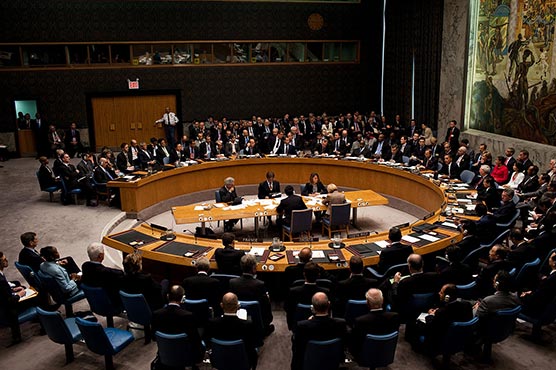Russia casts 13th veto of UN Security Council action during Syrian war

Only Russia and China voted in favor of their own text.
UNITED NATIONS (Reuters) - Russia cast its 13th veto on Thursday of U.N. Security Council action on the Syrian conflict, blocking a demand for a truce in northwest Syria because it does not include an exemption for military offensives against U.N. blacklisted militant groups.
China backed Russia by also blocking the text, drafted by Kuwait, Belgium and Germany. It was Beijing s seventh veto on the Syrian conflict. Equatorial Guinea abstained and the remaining 12 members of the council voted in favor.
Russia and China then put forward their own draft resolution demanding a truce in northwest Syria - with an exemption - but it failed to get enough votes. Only Russia and China voted in favor of their own text. Nine members voted against and South Africa, Indonesia, Ivory Coast and Equatorial Guinea abstained.
A resolution needs nine votes and no vetoes by Russia, China, France, Britain or the United States to pass.
Western states have accused Russian and Syrian forces of targeting civilians in northwest Syria, a charge they deny. They say they are targeting militants.
Russian U.N. Ambassador Vassily Nebenzia told the council before the votes that be believed the "real objective" of the draft resolution by Germany, Kuwait and Belgium was "to save the international terrorists who are entrenched in Idlib from their final defeat."
Syrian President Bashar al-Assad s forces, backed by Russian air power, have been waging a five-month-long offensive in the Idlib region, the last major chunk of territory still in rebel hands after more than eight years of war.
"What we are witnessing is not counterterrorism, but an excuse to continue a violent military campaign against those who refuse to accept the Assad regime s authority," U.S. Ambassador to the United Nations Kelly Craft told the council.
A crackdown by Assad on pro-democracy protesters in 2011 led to civil war and Islamic State militants then used the chaos to seize territory in Syria and Iraq.
"Those ... who object to humanitarian access to Syria, those who are currently carpet-bombing Idlib, will be held accountable. And those who are doing so will have to pay for the reconstruction. We act on the principle you broke it, you own it," French U.N. Ambassador Nicolas de Rivière told reporters.
Shortly after the first draft U.N. resolution was proposed by Kuwait, Germany and Belgium, Damascus declared a truce on Aug. 31 that brought a lull in air strikes. However, Syrian troops on Sunday shelled south of Idlib, according to rescuers and residents.
The United Nations said that since the start of hostilities in northwest Syria in April, more than 550 civilians have been killed and some 400,000 people displaced. Almost half of the displaced people are living in open-air areas or under trees.
The leaders of Turkey, Russia and Iran meeting in Ankara on Monday agreed to try to ease tensions in the Idlib region, but disagreements between the countries appeared to linger, especially over the threat from Islamic State.
U.N Secretary-General Antonio Guterres announced last month that the world body would investigate attacks on U.N.-supported facilities and other humanitarian sites in northwest Syria. Russia and Syria have said their forces are not targeting civilians or civilian infrastructure.

